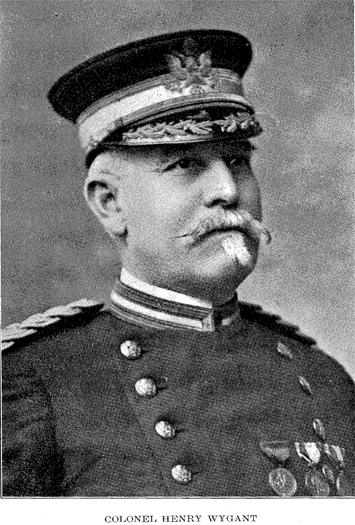 ¹
¹
 ¹
¹
Henry Wygant
Commanding Officer 22nd Infantry
August 11, 1903 - October 11, 1905
Henry Wygant was born in Almond, Allegany County, New York October 21, 1850.
Wygant entered the US Military
Academy on September 1, 1868 and graduated on June 14, 1872.
He graduated 52 out of a class of 57. His best subjects were
Mathematics and French and
his worst subjects were Gunnery and Geology. Upon graduation he
was commissioned
a 2nd Lieutenant in the 24th Infantry. The 24th Infantry was one
of the four "Buffalo Soldier" regiments,
being comprised of black enlisted men commanded by white
officers.
He served on frontier duty with
the 24th Infantry at Fort Brown, Texas from October 1 to December
5, 1872.
He then went to Brazos, Texas where he commanded the post there
from December 7, 1872 to March 31, 1873.
(He was actually on a leave of absence from March 23, 1873 to May
6, 1874, reason unspecified.) He was assigned
to Fort Brown, Texas from March 1874 to May 1875, Fort
Richardson, Texas from May 16 to July 3, 1875 and
then back to Fort Brown until December 8, 1875.
Wygant was then officially
posted to Ringgold Barracks near Rio Grande City in Starr County,
Texas from
December 12, 1875 to August 28, 1878. However, he took a leave of
absence from August 4 to September 6, 1876
and was a witness before a Court Martial at San Antonio from
September 27 to November 13, 1876.
On June 28, 1878 Wygant was promoted to 1st Lieutenant of the 24th Infantry.
He was stationed at Fort Duncan,
Texas from September 8, 1878 to June 6, 1879. From that time he
was on
recruiting service until January 22, 1880. Then he was back to
Fort Duncan for frontier duty until May 24, 1880,
at Fort Davis, Texas from May to October 1880 and at Fort Concho,
Texas from October to December 15, 1880.
His next posting was at Fort
Dodge, Kansas from December 1880 to February 22, 1881. He was
next at Fort Supply,
Indian Territory until October 6, 1883 and then Fort Reno, Indian
Territory until July 2, 1886. (He took a leave of absence
from May 3 to August 7, 1884 to travel to Cuba and Europe.)
From July 2, 1886 to August 1,
1888 Wygant was a Professor of Military Science and Tactics
at Bingham School, North Carolina.
During the entire time period above the Army Registers show that he served for certain with Company A from the years 1879-1888.
He was promoted to Captain on May 15, 1888 and given command of Company B 24th Infantry.
From August 1888 to October 1889
he was on frontier duty at Fort Grant, Arizona and then at San
Carlos, Arizona
until January 1890. From January 1890 to April 1, 1891 he was at
Fort Thomas, Arizona and then at Fort Huachuca,
Arizona until September 1893. From then until November 25, 1896
Wygant was in Richmond, Kentucky
teaching at Central University. He rejoined the Regiment at Fort
Douglas, Utah from November 1896 to April 20, 1898.
In June 1898 he went with the
24th Infantry to Cuba as Commanding Officer of Company B. He was
also given command
of 2nd Battalion 24th Infantry.
For the campaign in Cuba the
24th Infantry was assigned to the 3rd Brigade of the 1st
Division, 5th Army Corps.
The Commander of the 24th, Colonel Jacob F. Kent was promoted to
command the Division which left
Lieutenant Colonel Emerson H. Liscum in command of the Regiment.
Colonel Charles Wikoff of the
22nd Infantry had been promoted to command the 3rd Brigade. As
the assault on
San Juan Hill began Wikoff was killed and Lieutenant Colonel
Liscum was assigned to take command of the Brigade.
This left Captain Henry Wygant in command of the 24th Infantry
Regiment. Under Wygant's command the
24th Infantry was part of the assaulting force which captured the
Spanish trenches and fortifications
on the top of San Juan Hill.
For his leadership and courage that day Wygant was recommended for a Brevet promotion to Major, for
"....gallant and meritorious conduct at battle of San Juan Hill, Cuba."
The record does not show that
Wygant received the Brevet. It does show that he was officially
in command
of a battalion of the 24th Infantry from November 28, 1896 to
February 1899 and that he commanded the
Regiment at "...storming of San Juan Hill, Cuba, July 1,
1898." He served at the yellow fever camp at Siboney,
Cuba from July 15 to August 26, 1898 and returned with the
Regiment to the quarantine camp at Montauk,
Long Island, New York where he remained until September 20, 1898,
at which time he moved with the 24th Infantry
back to Fort Douglas, Utah.
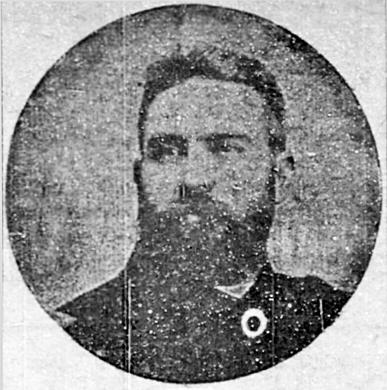
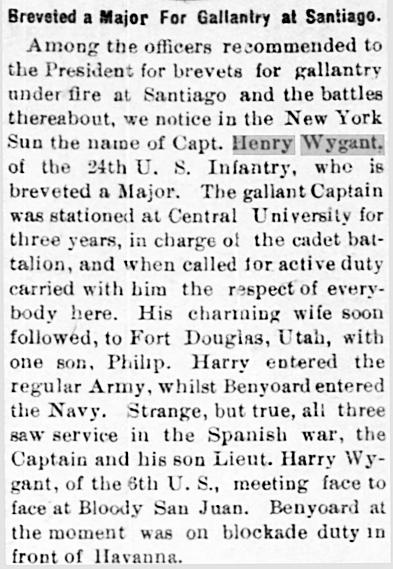
Newspaper article which
prematurely announced the award of a brevet promotion to Henry
Wygant.
Wygant never received the brevet. Photo shows Wygant as an
officer of the 24th Infantry during the War with Spain.
Note the article relates that Wygant's son, Henry Sollett Wygant,
also was at the Battle of San Juan Hill, serving with the
6th Infantry and that he and his father met on the battlefield.
(Both Wygant and his son were known by the nickname of
"Harry".)
Wygant's brother Benyoard also served in the War, in the U.S.
Navy.
Article from The Richmond Climax February 18, 1899 by jhgeorgeIII from Ancestry.com
The following is Captain
Henry Wygant's After Action Report, of the Battle of San Juan
Hill,
Cuba, July 1, 1898. He started the day as Commander of 2nd
Battalion, and ended the day as
Commander of the Regiment. The report is scanned directly from
the 1898 Congressional Serial Set:

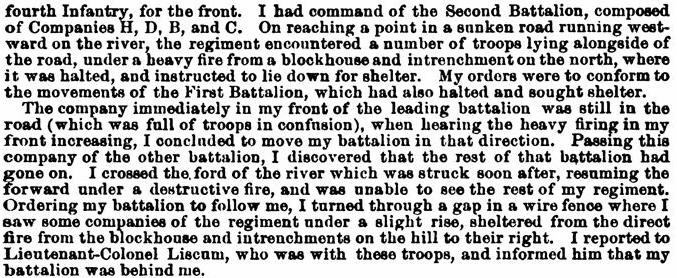
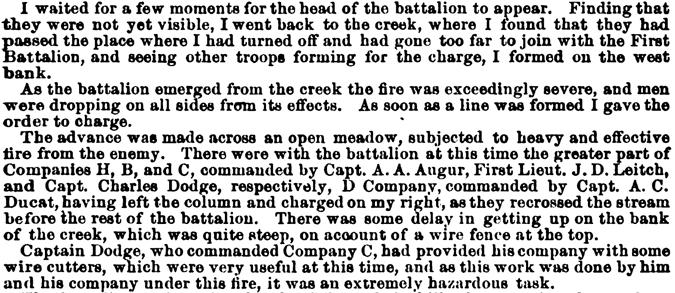
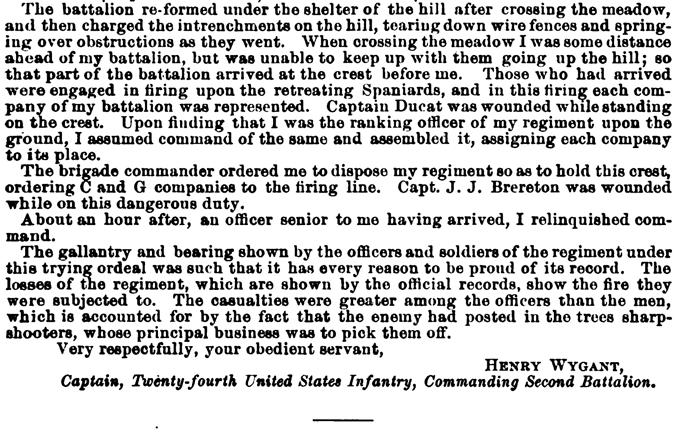
On March 2, 1899 Wygant was promoted to Major of the 24th Infantry.
In April 1899 he went with his
Regiment to Vancouver Barracks, Clark County, Washington where,
on July 1, 1899 the 24th Infantry received orders for duty in the
Philippines. He is listed as officially being in
command of the 24th Infantry during the voyage to Manila, July13
to August 20, 1899. Wygant commanded
the 1st Battalion of the 24th Infantry at the pumping station,
Maraquina River and El Deposito, Luzon
until September 1, 1899 and at San Fernando Pampagna and Mexico
Pampagna to October 1, 1899.
He commanded the post at San
Jose Nueva Ecija from February 28 to July 10, 1900. He was Acting
Inspector-General, 2nd District, Department of Northern Luzon to
August 1, 1901.
Wygant was promoted to
Lieutenant Colonel of the 6th Infantry on November 8, 1901. He
served with that Regiment
at Fort Leavenworth, Kansas until September 1, 1903. He commanded
the Post and the Military and Staff College
at Fort Leavenworth at various times during this interval.
On August 11, 1903 Henry Wygant was promoted to Colonel of the 22nd Infantry.
He joined the Regiment at Fort
Crook, Nebraska on September 1, 1903 and commanded the Regiment
and the Post of Fort Crook until October 23, 1903 when he left
for San Francisco and movement overseas
with the Regiment to the Philippines, leaving San Francisco on
October 31. Wygant and the Regiment arrived
at Manila on November 28 and by December 6 Wygant and his
headquarters were at Camp Marahui (soon to be
changed to Camp Keithley) on the island of Mindanao. Wygant
commanded the Regiment and the Post at Camp
Keithley at intervals until June 1, 1905. From June 1 to July 4,
1905 he commanded the Department of Mindanao.
On October 11, 1905 Wygant retired from the Army for "Disability Incident To The Service."
He took residence in Cranford, New Jersey.
Henry Wygant was a Veteran Companion of the Military Order of Foreign Wars.
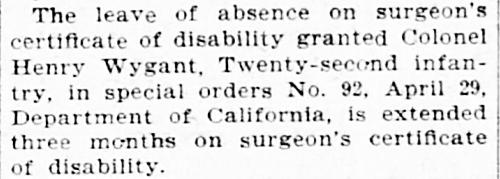
Clipping from the San
Francisco Call, Saturday, June 4, 1904,
illustrating the difficulties Wygant suffered, from the various
tropical diseases he incurred during his service.
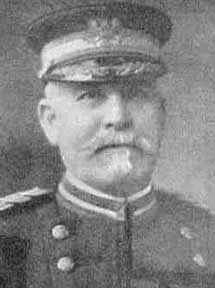
This portrait of Colonel Wygant hung on
the wall at 1st Battalion 22nd Infantry Headquarters
at Fort Hood, Texas, 1999-2009. Photo courtesy of Major Anne
LeGare, wife of LTC Marc LeGare,
Commanding Officer 1-22 IN 1999-2001.

The signature of Henry Wygant as
Commanding Officer 22nd Infantry on the Return of Casualties
of the 22nd Infantry for January 22, 1904.
Immediately below is a photo and
article about Henry Wygant
which appeared in the Illustrated Bee
from Omaha, Nebraska
August 30, 1903:
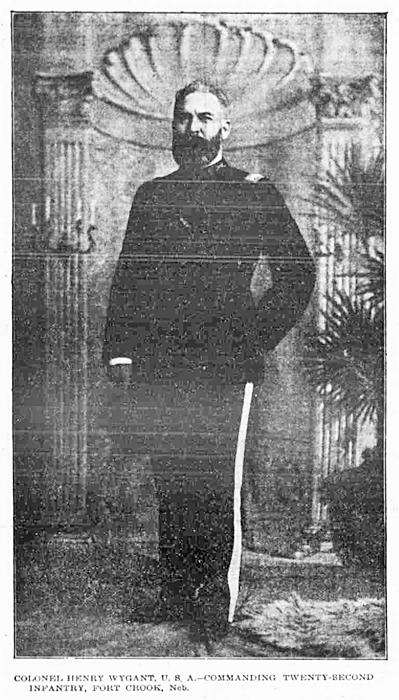
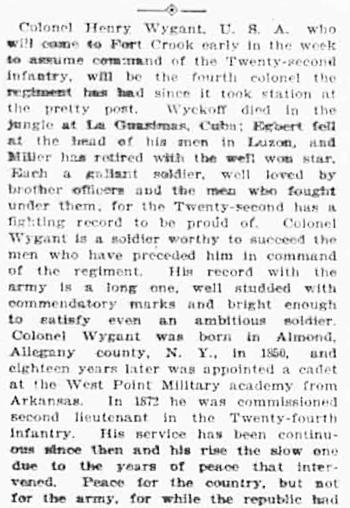
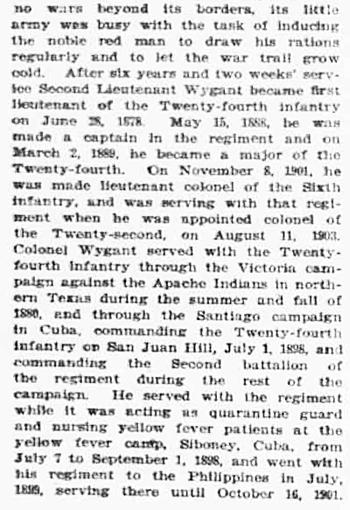
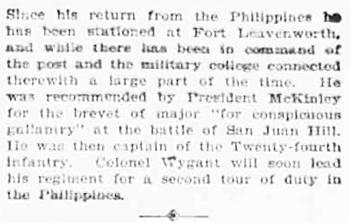
From the Library of Congress Chronicling America
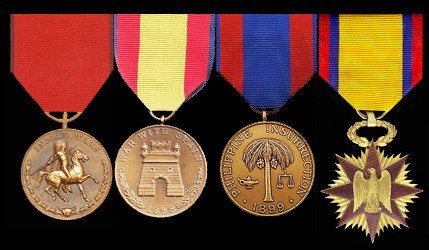
Colonel Henry Wygant's decorations
HENRY WYGANT
No. 2462. Class of 1872.
Died August 5, 1918, at Buffalo, New York, aged 67 years.
Henry Wygant was born at Almond,
Alleghany County, New York, on October 21st, 1850. His early
boyhood
was spent in Western New York, to which part of the State his
ancestors had moved in the early days of the
country's settlement. His mother died during his infancy and with
his father, Milo Hoyt Wygant, a lawyer, he moved
to Helena, Arkansas, during the latter days of the Civil War.
Henry's father wished him to be
a lawyer, but the presence of the Union Army in and about Helena
proved
an influence against which the more prosaic appeal of the legal
profession could not prevail. Failing to obtain
his father's sanction or assistance, he succeeded by his personal
efforts in securing an appointment to the
U. S. Military Academy, entering that institution from Arkansas
in 1868.
The environment was strange and
the tasks imposed presented difficulties to a young man with so
little
preparatory training, but the goal to be attained, a commission
in the regular service, was ever before his eyes
as an incentive to continued effort. Through four years of
varying fortunes, years very dear in his memory,
he applied himself with increasing zeal and a growing seriousness
of purpose. Cheerful, impetuous, enthusiastic,
he made warm friends among the instructors and members of the
corps. The nick name "Circ" gained in his
fourth class year remained with him among his classmates until
the time of his death. General Charles King,
novelist and soldier, who was Commandant of Cadets during
Wygant's tour at the Point, recently wrote of him to a friend:
"I remember Wygant very
well when 1 was Commandant. He was a sunny fellow with many
demerits
who endeared himself to all of us by his manly frankness."
Upon graduation, in 1873, Wygant
was commissioned as Second Lieutenant in the 24th Infantry, then
serving
on the Texas border. Two years after his graduation he married
Hellene Sollet of Brooklyn, New York. She was
the faithful partner of his vicissitudes and pleasures through
his long army life; his counselor and inspiration.
To his mind, no sketch of his life would be complete which did
not include a passing tribute to her excellence as a wife and
mother.
He served as an officer in the
24th Infantry continuously as Second Lieutenant, First
Lieutenant, Captain and Major
until November 8th, 1901. During these many years he served with
his regiment in Texas, Kansas, Arizona, Utah, Wyoming
and Washington; had recruiting service at Memphis and Nashville;
was Indian agent at Washikie, Wyoming, and was detailed
as Military Instructor at the Bingham School in North Carolina
and at the Central University at Richmond, Kentucky.
While at the latter institution he inaugurated military training
at two of its preparatory schools, the one in the Kentucky
mountains
at Jackson and the other at Owensboro.
Wygant went to Cuba with the
24th Infantry in 1898, serving through the Santiago campaign. As
Captain, he commanded
first his battalion and later his regiment in the assault on San
Juan Hill, being recommended for a Brevet for gallant and
meritorious service in that action. At the concentration camp for
yellow fever patients at Siboney, after the capitulation,
he with the entire regiment who had volunteered for this perilous
service, spent many weeks when the greater portion
of our expeditionary force had been returned to the United
States. Letters from brother officers, now held in sacred trust
by the members of his family, testify to his coolness and bravery
under fire and his unselfish devotion to duty in the
trying days at Siboney when officers and soldiers were succumbing
in appalling numbers to the fearful malady.
He was promoted to a
Lieutenant-Colonelcy in the 6th U. S. Infantry at Fort
Leavenworth, Kansas, and later to a Colonelcy
in the 22nd Infantry at Fort Crook, Nebraska. With both of these
regiments he served in the Philippines, being many times
under fire in the Philippine insurrection. He was for a time
Inspector General of the second district of Northern Luzon and
later served with his regiment against the Moros in the Island of
Mindanao. He was three times invalided home from the Tropics;
the last time with amoebaea, for which trouble he was retired
October 11th, 1905.
Soon after his retirement he established his residence at Cranford, New Jersey, where he lived until shortly before his death.
In Cranford, Colonel Wygant made
warm friends and received many marks of attention and esteem,
During the years
of his residence there he busied himself with movements having
for their purpose the upbuilding of the youth of that community
and the promotion of loyal Americanism. He was a friend and an
ardent admirer of Theodore Roosevelt, whose
autographed photograph, a Christmas present from the latter, hung
with others in his picturesque den at Cranford.
In his early years Colonel Wygant was an enthusiastic and
successful huntsman and his home was adorned with many trophies
of the chase. He was a collector of arms and curios, and his
collection was unique of its kind. On the walls of his home
hung the stone hatchet of the Aztec, the spear of the Moro, and
the scimitar of the Turk, a never ending source of interest
to his visitors old and young.
It was to him a source of keen
regret that the War Department found it impossible to honor his
repeated requests
for active service in the great war which has just drawn to a
successful close.
Failing in health for many
months, he sought relief in change of climate, moving to Buffalo,
New York, in the spring of 1918.
The change did not prove beneficial. He died of pernicious anemia
on August 5th; funeral services being held at the home of his
son,
Philip Wygant of that city, following which his body was interred
in Arlington cemetery in Virginia.
His personality was compelling,
his influence strong and uplifting. He was one whose honesty and
optimism bound to him
young and old with bonds of strong affection. His life was an
open book, its pages unsullied by a single dishonorable act.
His intense hatred of things unjust or mean, his fearless
championship of right, as it was given him to see the right, his
complete fairness and candor carried with them greater conviction
than the reasoning of profounder men. He was an able soldier,
a dutiful husband, a generous father. His loss is a source of
deep bereavement to the many who loved him.
His memory is revered by all who had the good fortune to know
him. ¹
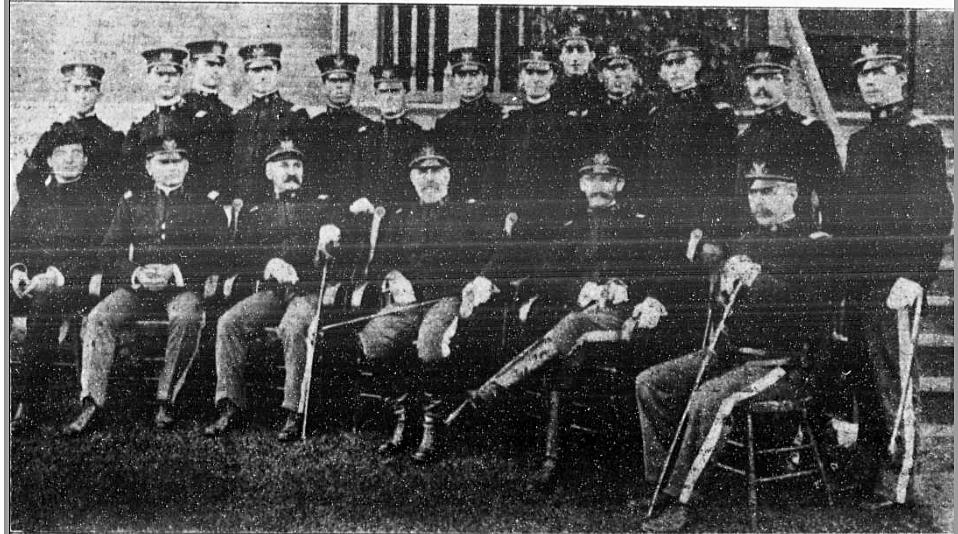
Colonel Henry Wygant and officers of
the 22nd Infantry Fort Crook, Nebraska 1903.
Wygant is seated third from the right.
Photo from the Omaha Daily
Bee, October 11, 1903
University of Nebraska, Lincoln , Nebraska State
Historical Society
Henry Wygant is buried in Arlington National Cemetery
Section 2 Grave 898
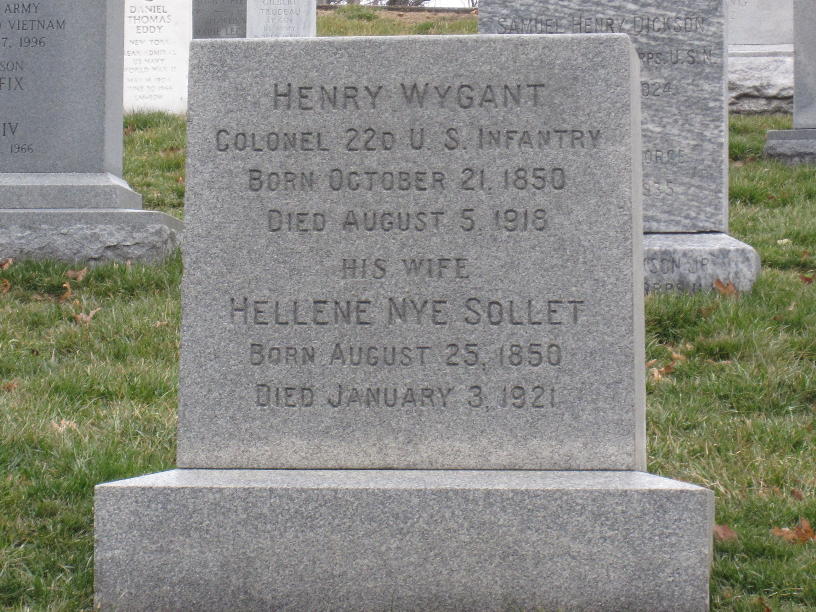
Grave marker for Henry Wygant
Photo by Joe from the Find A Grave website
¹ Photo of Henry Wygant taken while he was
Colonel of the 22nd Infantry from:
Fiftieth Annual Report of the Association of Graduates of the
United States Military Academy
at West Point, New York June 10, 1919, Seemann & Peters,
Inc., Saginaw, Michigan
Home | Photos | Battles & History | Current |
Rosters & Reports | Medal of Honor | Killed
in Action |
Personnel Locator | Commanders | Station
List | Campaigns |
Honors | Insignia & Memorabilia | 4-42
Artillery | Taps |
What's New | Editorial | Links |